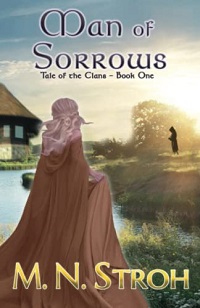Mara, a fifteen-year-old shepherdess, receives divine visitations that predict the future (like her late mother’s demise) and direct her to marry a man who will “humble himself by the sign of the cross.” After she sees a sign that her proposed husband is her best friend Áine’s brother, Marcan, she knows she’ll have trouble convincing him: Marcan is a pious monk at the Cill Dálua community who transforms vellum into beautiful, illuminated manuscripts.
Because he thinks he unwittingly caused his mother’s and brother’s deaths, Marcan accepts the abbot’s harsh rule. His father, needing Marcan to tend flocks at home, had waited to give him to the church, as he was duty-bound to do with his firstborn, and Marcan feels God is punishing him for the delay. The second romance involves the cross-class relationship between Áine and Davan, nephew of Chief Cennedigh of the Dal Cais, in a subplot that offers multiple surprises.
In this short novel, Stroh proficiently interweaves multiple viewpoints and plot threads without losing the reader’s attention. The characters and their religious beliefs feel period-appropriate. Mara’s steadfastness is admirable, and Marcan’s internal pain is evident as he struggles to determine God’s purpose for his life. The writing style ranges from smooth to overly formal and cumbersome (“I exist but to guard his means so that he might dote upon you”). The novel also needs a stronger copyedit. With the trials they undergo, Mara and Marcan deserve a happy ending, and it’s rewarding to see how they achieve it.
Man of Sorrows was published by Olivia Kimbrell Press in 2022; I wrote this review for the Historical Novels Review's August 2023 issue. The next three books in the series, which feature different characters from this book and are set two decades later, in the 960s, are Rise of Betrayal, Lord of Vengeance, and Stone of Division. Cill Dálua is now known as Killaloe, a town and parish in County Clare.





No comments:
Post a Comment